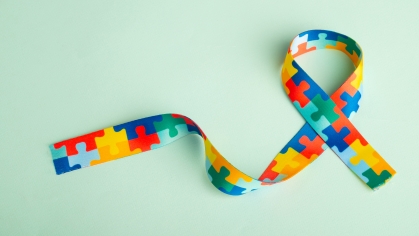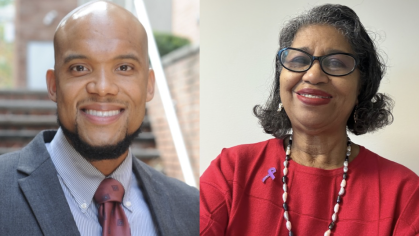November 20 is Transgender Day of Remembrance. DSW student Zan Haggerty shares what Transgender Day of Remembrance means to them and how social work students and practitioners can commemorate this month.
Tell us a bit about your journey to social work.
For years I have been engaging in community organizing and grassroots movements. Yet, I did not have the language or training that I needed to be as effective as I wanted. In my years working with communities, I noticed that I always wanted to be able to do a little bit more, go a little bit deeper, and feel like I could contribute to healing beyond organizing. I had been working in communities where I was an outsider, both internationally and domestically, and began to reflect on my positionality and grapple with what help I could and really should offer. I decided to return to my community in New Jersey, and in doing so, realized that I was drawn to clinical work but had no training. As I went through my MSW program, I was grateful to learn that I had been doing social work long before I had the degree, but now I was part of a community and profession that made sense to me. I had a shared value system, code of ethics, and call to action simply through being a social worker. I remember finishing my master’s program and thinking I would never return to school because I was happy to have my MSW and be able to provide clinical services. Somehow, after several years of practice, I noticed a huge gap in clinical services for the transgender community. Though there are many guides for effective models of gender affirming care, these models are not yet widely known and practiced outside of the queer and trans community. This led me to apply to and enroll in the Doctor of Social Work program at Rutgers where I aim to bridge the gap between research and practice for gender affirming care. It is my hope to use my degree to increase access to high quality gender affirming care and teach and train early career social workers in providing these lifesaving services. It is a fundamental multidisciplinary service that we must tend to in order to uphold our professional mandates.
What is the significance of Transgender Day of Remembrance (TDOR) for you?
Transgender Day of Remembrance is a day of mourning for me. It is a day that I aim to do what I can to support our community, particularly because I hold many privileged identities. It is a day that I reflect on our community and hope to honor the memory of our trans siblings who were murdered. My hope is to spend this day reflecting on how to better support our community, while hoping that others who are not part of our community will come together in support of us. In the same way it is imperative that I, as a white trans person, speak up and aim to provide additional labor and support for my trans siblings of color, it is imperative that cisgender people speak up and provide labor and support for our community more broadly. I dream of a time when there are no names to read on TDOR because trans people are able to die of natural causes instead of transphobia, trans misogynoir, and hatred.
How can the social work community recognize and commemorate Transgender Day of Remembrance?
Social workers should begin by talking about Trans Day of Remembrance with each other and in their communities. This day is meant to honor the lives of our trans siblings who lost their lives to anti-trans violence. We must talk about the tragedies that are impacting our communities because if people are not aware of the scope of the problem, we will never be able to address it. There are a few social forces at play lately that make TDOR crucial to discuss. First, there has been a rise in people who identify as transgender or gender expansive. This is not because of a social contagion, but rather because of an increase in social acceptance has allowed more people to feel safe to live authentically as their true gender identity. The rise in the trans community is a huge win that is the result of years of fighting.
Yet even with the increase in representation in the population, transgender people still are in the minority (about 1 million Americans)1, which brings me to the second force at play: the political landscape. Despite trans people accounting for less than one percent of the population, current policies are targeting transgender people and specifically trans youth, among the most vulnerable members of our community. These policies aim to restrict access to essential medical care, the absence of which is directly linked to increased rates of suicide, depression, and anxiety.2 If social workers do not talk about Transgender Day of Remembrance, we will continue to need this day to remember the horrible daily violence experienced by our community. We must unite and identify this as a problem for all of us, rather than a problem just for the trans or queer community. This is especially important because those who are most frequently targeted for violence are trans women of color. Fighting for trans justice is an act of anti-racism because the majority of violence against the trans community is aimed at people of color. Social workers must use our position of privilege and power to generate justice for the trans community so in future years we no longer need a day of remembrance.
What can the social work profession or social workers do to continue to support transgender community beyond this month?
Adjusting language is a great place to start. Recent studies have indicated there’s a huge positive impact in using a transgender person’s lived or chosen name and their pronouns.3 The simple act of addressing people how they want to be addressed is linked to reduced suicidality and a reduction in mood disorders. Making our language gender neutral is a subtle way we can demonstrate safety and inclusion to a population that is under attack now more than ever. Our language signals to others who we are talking about, who we are talking to, and who we are including or excluding in our work. If trans people are not considered in your language, we know we are not considered in your world as we should be.
Another crucial task for social workers is policy reform and advocacy. We cannot forget our duty as social workers to advocate for laws and regulations that uphold our core values and honor the dignity and worth of all. In New Jersey, we are lucky to have a supportive governor who has passed legislation that upholds best practices for gender affirming care in social, legal, and medical settings. Unfortunately, individuals with power are not always willing to honor these laws. For example, many school boards and adults involved in school systems disregard when trans young people tell them their chosen or lived name and disclose their pronouns. Instead, they opt to not upset the parents and deadname or misname the youth while also misgendering them. Social workers are in schools, we are on school boards, and we work with children, adolescents, parents, and administrators. If we do not advocate for upholding the law, we will be complicit in the negative mental health outcomes for transgender youth. We must support trans youth so they can become trans adults, even if it is uncomfortable. The alternative in this case is truly one of life and death.
[1] Meerwijk, E. L., & Sevelius, J. M. (2017). Transgender population size in the United States: a meta-regression of population-based probability samples. American journal of public health, 107(2), e1-e8.
[2] The Trevor Project. (2021). 2021 National Survey on LGBTQ Youth Mental Health. West Hollywood, California: The Trevor Project.
[3] The Trevor Project. (2021). 2021 National Survey on LGBTQ Youth Mental Health. West Hollywood, California: The Trevor Project.
This story was created in partnership with Rutgers School of Social Work's Inclusion, Intersectionality, Diversity, Equity, and Advancement (IIDEA) Committee.



